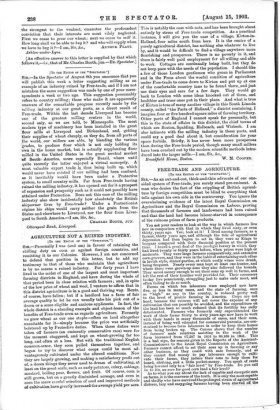MILLING.
[To THE EDITOR OF THE "SPECTATOR."] Sic,,—You name a factor far more vital to fiscal controversy than the purchase of a motor-car in France when you refer to the milling industry. There may be "no statis- tical evidence to prove the ruin of country millers," but the fact is apparent in the forsaken mills and properties—many still filled with costly machinery—scattered throughout the country; and also, alas! in thepresent destitute condition of their former proprietors. But the argument is not wholly confined to country millers ; town millers, who, as you correctly state, invested in modern machinery, have been reduced to like case. Within recent years one owner avowed aloes of £60,000 in five years,—not by speculation either. Another practical miller, owning a port mill in addition to an inland mill, is at this moment employed in Liverpool docks. There are many living examples, not from the class who had not the means, but those who converted their concerns to the "roller process" when the revolution in methods occurred some fifteen or twenty years ago, and who spent lavishly on machinery. The mammoth mills which have grownup at the ports, andthe large concerns worked on strict Co-operative lines, under the most advantageous con- ditions, commercial and manufacturing, show lamentably un- profitable working. The whole industry has suffered heavily, and almost silently, from unfair "dumping" of millions of barrels of American flour annually—free. Undoubtedly the consumer has benefited, but at what cost P Count it for your- selves, you could not allot space till it was told. You say English millers must produce as cheaply or stand aside. Let me explain the system why competition fails. All the flour that comes is a surplus. A consigned-clearance sale to relieve home markets. The colossal mills in America, too, are unable to make profit, but they still go on making too much flour, exporting it to the British Isles. This excessive production has resulted iu the parlous state of our own industry. The dictum of economists is,—if capital earns inadequate return, it will be withdrawn, and invested in a more profitable industry. The result has borne this theory out fully. As a natural sequence wages in milling have fallen, and again as a natural sequence skilled labour is almost unobtainable. Foremen work longer hours for lower wages than mechanics, and rollermen and purifierinen than joiners and bricksetters. An important industry has languished, its capital and its labour have drifted into competition with more favoured trades. In skill, in science, in organisation, in care, British millers stand supreme; their methods and machinery are unique and unequalled; but from the largest to the smallest, from the strongest to the weakest, emanates the profoundest conviction that their interests are most vilely neglected. First we cease to grow our wheat; next we cease to mill it. How long shall we be able to buy it ? and who will supply when
[An effective answer to this letter is supplied by that which follows it,—i.e., that of Mr. Charles Booth, jun.—ED. Spectator.]







































 Previous page
Previous page